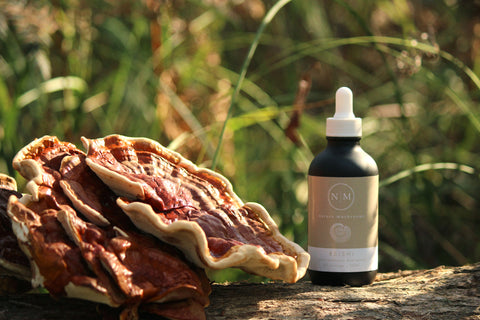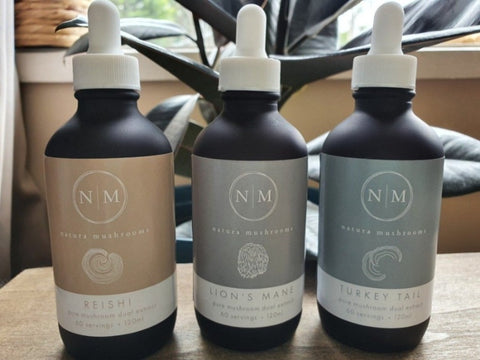Best medicinal mushrooms for gut health
Gut health is so much more than the food we eat and how often we poop.
Scientists are becoming increasingly aware of the role the gut microbiome has on human health, with our gut bacteria linked to things like immunity, heart health, mood, mental health, homeostasis and overall wellbeing. So, when we talk about gut health, we’re kinda talking about overall health.
And if our gut plays such an important role human health — then how can we do the right thing for our body?
Gut-loving medicinal mushrooms, of course.
Let’s dive into…
- What are medicinal mushrooms?
- What is the gut microbiome?
- The best medicinal mushrooms for gut health
- Where to buy medicinal mushrooms for gut health
What are medicinal mushrooms?
We’re pretty much talking about mushrooms that are really, really, really good for you.
Yep, medicinal mushrooms are defined as “macroscopic fungi” used for medicinal and nutritional purposes. They contain a high concentration of “active compounds” which work to support a healthy immune function and response (amongst other things).
More specifically, medicinal mushrooms contain a high concentration of active polysaccharides (a fancy word for long chain carbohydrates) which can trigger changes to the immune system.
Plus, all we need to do is look to Traditional Chinese Medicine where they’ve used medicinal mushrooms for their therapeutic and nutritional value for thousands of years (with plenty of anecdotal and scientific research to back it up). So, there’s that.
What is the gut microbiome? And why is it sooo important?
It seems like everyone’s nattering on about the gut microbiome.
While we learn from a young age that food gives us fuel to live our lives, few people truly understand the connection between digestion and overall health.
When we talk about the gut microbiome, we’re talking about the “gut” (AKA the stomach, oesophagus, intestines and anus) as well as the “microbiome” (AKA a community of organisms living together).
The human gut is made up of trillions (yes, trillions) of microorganisms, like bacteria, viruses, fungi and protozoa. And here’s the thing, this unique combination of microorganisms looks different from person to person, and the balance of bacteria in your gut is a result of your genetics, upbringing and lived experiences.
Today, scientists believe the microorganisms in our gut play a significant role in health and wellbeing, influencing the presence of diseases (like heart conditions and cancer).
So, are mushrooms good for the gut?
Yes, mushrooms are good for the gut. Like, really, really good.
That’s because mushrooms are high in prebiotics, beta-glucans and other gut-loving compounds.
Prebiotics act as a source of food for our gut’s healthy bacteria (and in turn, this helps keep our microbiome and whole body healthy). One of the most noteworthy prebiotics in mushrooms are beta-glucans — a type of soluble fibre that contributes to a range of health benefits — from heart health to blood sugar to inflammation.
Not only that, mushrooms are low in calories and high in nutrients, making them an ideal staple in your diet.
Best medicinal mushrooms for gut health — turkey tail, lion’s mane and reishi
Let’s cut to the chase and look at the best medicinal mushrooms for gut health.
Turkey tail for gut health
Despite its silly name, turkey tail is a mushroom you’ll want to take seriously.
Native to Europe, Asia and South America, turkey tail is a bracket fungus that’s been used in Chinese medicine for thousands of years to promote wellbeing, vitality and longevity. It commonly grows out of dead and decaying logs, recognised by its tiered layers and striking colours.
Turkey tail is particularly famous for its immune-boosting properties (so much so, there’s ongoing research into the use of turkey tail to support traditional cancer treatment).
And, when we consider the connection between gut health and immunity, it all starts making sense.
An 8-week study in 24 healthy individuals compared the consumption of antibiotics, an extract from turkey tail mushroom and no treatment (control group)[1]. The study found the group receiving the turkey tail extract had beneficial changes in their gut bacteria and suppressed the growth of not-so-good bacteria (like E. coli and Shigella). This is in contrast to the group receiving antibiotics (who saw an increase in problematic bacteria) and the group receiving no treatment (who saw no notable changes in the microbiome).
Lion’s mane for gut health
Commonly found on dead or decaying hardwood throughout the northern hemisphere, lion’s mane has a series of drooping, icicle-like spines, often being likened to a pom-pom or old man’s beard.
It’s often celebrated for its influence on our brain. Buuuut as it turns out, lion’s mane could also promote overall gut health.
For starters, a 2017 mice study found that lion’s mane could boost immunity by increasing activity in the intestines and encouraging the growth of good gut bacteria. [2]
Not only that, but studies have also found lion’s mane may protect against the development of stomach ulcers and the growth of H. pylori (a not-so-good stomach bacteria). [3] [4]
We might add, many of the studies into lion’s mane and gut health have been carried out in test tubes and rats. More human research is needed to draw any conclusions — but the early signs are looking good.
Reishi for gut health
A well-known medicinal mushroom, reishi typically grows on dead or decaying hardwood as a series of kidney-shaped fans with a deep, earthy colour and glossy sheen.
Reishi is often linked to heightened immunity, reduced stress and heart health. And now with emerging research, it’s also being linked to gut health.
A 2015 mice study determined reishi may be used as a prebiotic to prevent gut imbalances and obesity-related disorders. Yep, the study found mice kept on a high-fat diet gained up to 25 percent more than mice who were on the same diet, but also consumed extracts from reishi mushroom. [5]
And, similarly to turkey tail and lion’s mane, reishi is believed to contain a high concentration of prebiotics to nourish our good gut bacteria.

Where to buy mushrooms for gut health — turkey tail, lion’s mane and reishi
In Australia, there are a range of turkey tail, lion’s mane and reishi supplements on the market, ranging from capsules to powders to tinctures.
At Natura Mushrooms, we hand-cultivate our turkey tail, lion’s mane and reishi varieties on our mushroom farm in Gippsland, Victoria. Then, we use a range of extraction methods to draw out the benefits.
You can incorporate medicinal mushrooms into your diet by adding them…
- To your morning coffee or tea
- To smoothies or juices
- To soups or main meals
- Straight into your mouth
We recommend taking:
- ½ a teaspoon of powder daily, or
- 2 ml of liquid extract daily
Discover our…
Lastly, we recommend consulting your doctor or health care professional before beginning with mushroom supplements. The medicinal mushroom varieties we grow are considered well-tolerated and safe to consume, however, it’s always best to seek guidance first.

Resources:
- https://pubmed.ncbi.nlm.nih.gov/25006989/
- https://pubmed.ncbi.nlm.nih.gov/28266682/
- https://pubmed.ncbi.nlm.nih.gov/26853960/
- https://pubmed.ncbi.nlm.nih.gov/26364939/
- https://www.nature.com/articles/ncomms8489
- https://www.ncbi.nlm.nih.gov/pmc/articles/PMC5618583/
